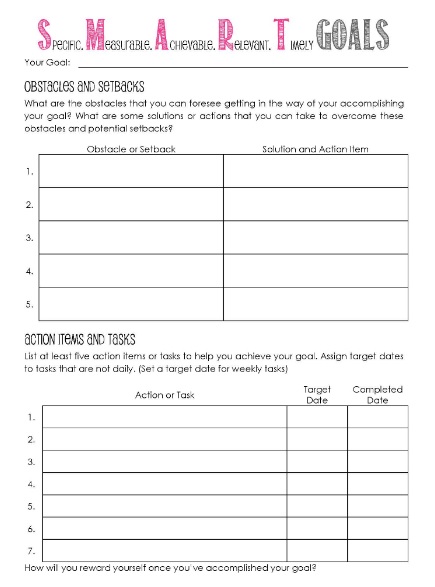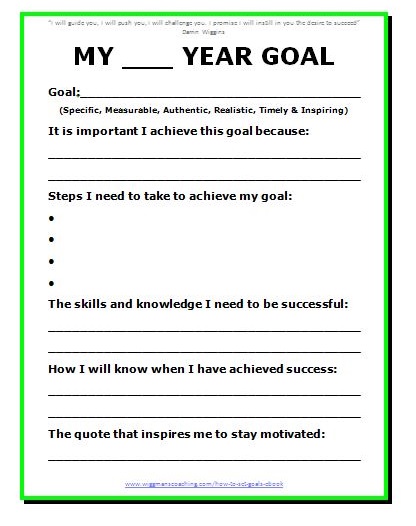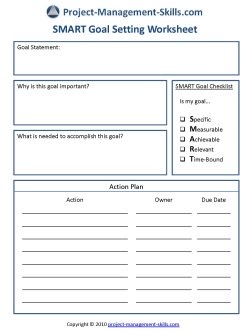Goal Setting Tips For 2018
Think all goals are created equal?
Think again! Apply these tips on setting goals and watch your results soar.
Is there a knack to goal setting?
Absolutely.
The following tips on setting goals will allow you to join the most successful people in zeroing in on and achieving the results you want.
Sample PDF Printable Sheets:
PDF – Weekly-Goal-Planning-Sheet-printable-word-doc-pdf-template-
PDF – PowerPrinciples-Goal-Sheet-Free-PDF-Template-Download
Designing any goals for your life — or your career — sets you apart from almost everyone you meet. Some studies estimate that a full 75%of Americans, for example, fail to create goals at all.
But the differences don’t stop there.
The way you approach the process of defining and describing your goals can have a huge impact on how goals work for you.
In other words, all goals are not created equal! Using the right technique for how to set goals leads to better results.
Let these tips on setting goals support you in creating winners that will get you, literally, across the goal line.
Think of them as a last minute locker room pep talk before the big game. You’ve got the book of plays and a winning attitude. Applying these tips on setting goals gives you one last boost as you begin writing goals — ie, hit the field and start playing.
Tip Number 1: Think Big, Think Really, Really Big
No matter what kind of goals you have in mind, the sky is literally the limit when thinking about the future.
Or it should be.
One thing I know for sure is that there is absolutely no possible way to achieve a goal you are unwilling to even think about reaching.If you tell yourself something can’t be done you will always prove yourself right.
Unfortunately, we can become conditioned over time, almost unconsciously, to prevent ourselves from acknowledging what we really want.We’re afraid we’ll look bad owning up to our big dreams so we edit them down to something more presentable.
Even when we’re just conversing with ourselves. A strong goal orientation begins with dropping this limiting belief.
Tony Robbins’ famous two swimming pools story illustrates this problem beautifully. As children we feel free to admit to our wants, even when they consist of something someone else already has. But as adults, worrying about looking greedy, we edit our dreams.
The antidote is to realize that goal setting, at least, is the wrong time to engage in the habit of admitting to wanting less. Instead allow yourself to see and acknowledge all of your dreams. Write goals that truly reflect what you want.
The really big dreams may take more work and more time but you can still make them happen.
Freeing yourself to think as big as you want to is crucial to creating a vision of the future you’re working towards. Which is why thinking big is featured so prominently among these tips on setting goals. Without vision you cannot achieve. As you move from visioning to sitting down to write your goals you will have plenty of opportunity to scale back or postpone what doesn’t feel right in the moment. Honestly admitting what you would really like is the best possible starting point towards setting goals of all kinds.
Tip Number 2: Make sure the goals you set are truly your goals.
Our education, training and upbringing can interfere with setting goals for ourselves in another way. Whether we’re setting life goals or professional ones we can find ourselves aiming for something that is someone else’s goal for us and not our own.
Do not fall into this trap.
Your truly burning desire for achieving the object of your goal is one of the primary reasons goals work as motivational and organizational tool. Your desire creates effort and your effort creates action which increases desire which increases action and leads ultimately to results.
That desire is a key fuel for the whole process.
We need the second of these tips on setting goals to preserve the element of desire. Unfortunately, for lots of reasons we sometimes pretend enthusiasm or interest in a goal that someone else thinks we should follow.
Perhaps you’re setting career goals with a supervisor as part of an annual review. Hitting a super-high stretch target for yearly sales may not be our highest priority.But admitting our objective is lower would be embarrassing.
Or maybe you’re planning to work in the legal field when your education is complete. Your family hears your plans and immediately assumes you are headed for law school.Wanting to be helpful they jump in with an offer to help financially as much as they can. The fact is a paralegal career will be just fine with you. The education required and job itself feel more attractive. But you feel it would be awkward to admit that your goal is actually lower than what has been assumed.
In both cases rather than say so you resolve to keep quiet and go along.
What happens? Because your so-called goal isn’t really yours you lack enthusiasm. Your low desire leads to much lower effort. Instead of charging ahead with excitement you drag along sort of pursuingthe goal you’ve been assigned but secretly hoping you’ll be saved and left to the goal of your own design.
Whether you want it or not your lack of effort will ultimately betray your lack of interest in a specific goal.
Goal setting does nothing for you in this environment but trap you further. Instead of getting more done because you’ve set a goal you actually accomplish less.
The second of our tips on setting goals is to avoid this at all costs by making sure that when you set a goal it is truly yours and not someone else’s. How can you tell if you’ve achieved it? The key to achieving this second tip on goal setting is feeling true desire in your heart for achieving your goals. Is it something you want? Really want? For yourself? When the answer is yes you’re ready to go.
Tip Number 3: Write Your Goals Down
To set a goal, write it down.
Period.
Make having written goals a rule you never break and see the kind of results you achieve.
Why write goals?
Written goals:
feel more real than goals held only in the mind.
inspire greater commitment.
are more defined. You can “change your mind” with ease but once a goal is down on paper change is more significant.
Are simply more effective, by every measure, than unwritten goals.
Does this mean you need a special notebook with a fancy cover for goal setting?
Should you set a ritual at a special time of day with a candle and music before writing goals down?
You could, but that is missing the point.
It is not the act of writing goals but the fact of writing goals that matters.
We squeeze more results out of goals that are in writing because of the psychology of the human brain and spirit and also because we can apply specific success strategies to written goals that are more difficult to apply to a thought alone.
Third on the list of tips on setting goals is that if you’re going to go for it and give it everthing you’ve got, grab a pen and commit your goals to writing.
Is this everything you need to know to be a goal setting superstar? You already know that it’s not. Lots more tips on setting goals, plus specific examples, background and other useful information is packed into this website.
These tips will, however, get you off to a grand start. As you know, if you set goals at all you’ll give yourself an advantage over almost everyone else who is trying to achieve the same thing. Regularly following these tips on setting goals will position you for better, faster, results.




